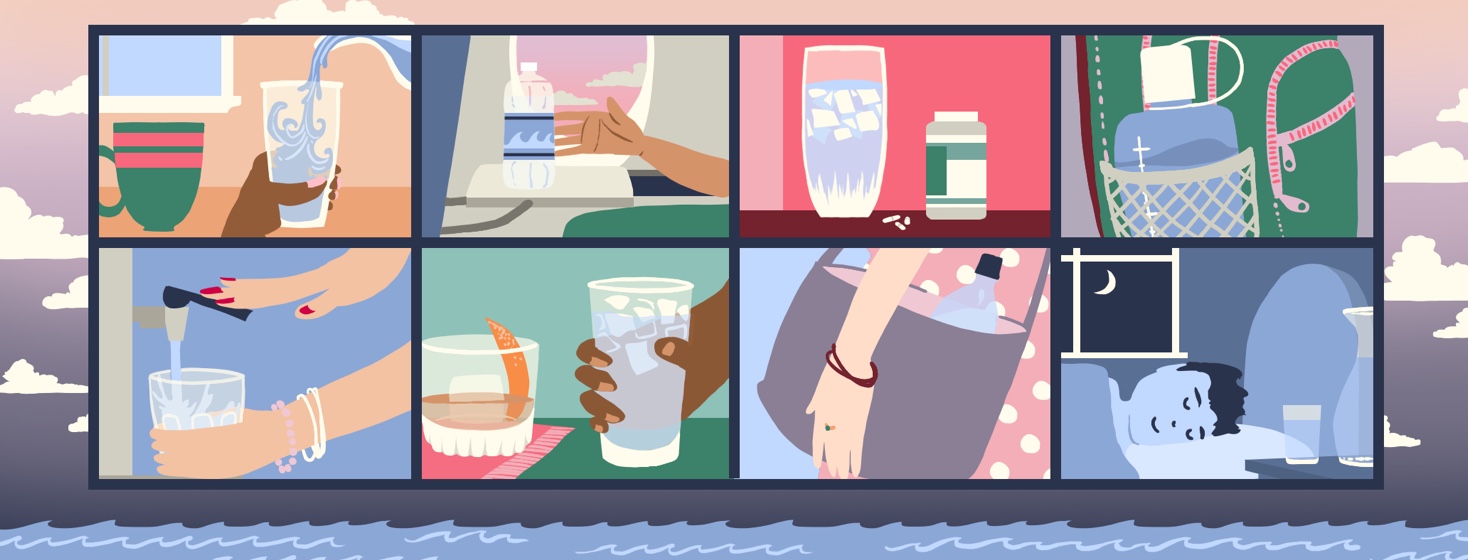IBS, Sleep and Fatigue: The Dehydration Connection
Some IBS symptoms naturally result in dehydration. Vomiting and chronic diarrhea are two of the bigger concerns. It makes sense: any time your body purges itself, it releases a lot of fluid simultaneously.
Dehydration, poor sleep, and daytime fatigue compose a triangle of concerns for people with IBS. Dehydration exacerbates IBS and can lead to chronic problems with diarrhea and constipation. This can also disrupt sleep as well as lead to problems with daytime fatigue.
Sleep and dehydration
Inadequate sleep
Recently, scientists revealed in a large population study in China that those sleeping under six hours nightly are at a higher risk for dehydration.
Lead researcher Asher Rosinger, assistance professor of behavioral health at Penn State University, suggests that timing of the body’s release of the hydration-regulating hormone, vasopressin, as important.
"Vasopressin is released both more quickly and later on in the sleep cycle," Rosinger told Science Daily. "If you're waking up earlier, you might miss that window in which more of the hormone is released, causing a disruption in the body's hydration."
Night sweats
It’s normal to sweat a little bit as you sleep. The skin excretes toxins during sleep and perspires to cool down an over warm body. However, excessive sweating at night leads to dehydration.
Sleep disorders
Some sleep disorders can cause heavy sweating: sleep apnea, menopause-related sleeplessness, sleep terrors, and nightmare disorder.
Nighttime IBS symptoms
IBS symptoms that can lead to poor sleep include bloating, cramping, gastroesophageal reflux disease (GERD) and nausea. Left untreated, these will lead to short sleep and dehydration.
Even one or two nights of restless sleep can disrupt digestion. If you’re in a flareup, you’ll add insult to injury if you don’t maintain quality sleep.
Melatonin
Melatonin supplements can regulate sleep for people with digestive disorders. Taking a small dose at bedtime with a full glass of water can offer many advantages: it improves sleep quality, provides hydration, maintains healthy gut motility, and provide pain relief for those experiencing IBS discomfort.
Daytime fatigue and dehydration
Who doesn’t reach for a cup of coffee or tea to wake up? Caffeine stimulates alertness and fends off fatigue… for a while. However, caffeine is diuretic; it accelerates waste production in the kidneys.
The result? That expected trip to the bathroom by mid-morning. However, without replacing these lost fluids, the body dehydrates, setting the stage for daytime fatigue.
Even without morning caffeine, and in the absence of a hidden sleep disorder (which could be the cause of daytime fatigue or excessive daytime sleepiness), you may still not be drinking enough water during the day. If so, you’ll experience mental “fog” or low physical energy… and the need to nap.
Yet, long daytime naps disrupt the circadian system and make it hard to fall asleep at night, cutting into the eight hours you need to stay healthy.
Strategies: IBS, dehydration and sleep
- For some with IBS, the “three F” strategy (fiber, fluids, and fitness) works, but only if you remember the fluids! Without them, dehydration leads to poor digestion — bloating, cramping, constipation and diarrhea can result, even at bedtime.
- Air travel does a number on both the digestive tract and circadian rhythms. Dehydration only makes things worse, so sip water regularly during a long flight.
- Do your medications dehydrate you? Certain ones, like blood pressure drugs, generate a diuretic effect, increasing urine output that can lead to dehydration. Talk to your doctor about the timing of your meds; when taken during the day, you can actively replenish lost fluids.
- If you’re in a flareup, make drinking water in normal amounts all day your default mode. It will flush your system and replace fluids lost to chronic diarrhea or vomiting during severe IBS.
- You might be eliminating certain foods to address allergy concerns. If they’re certain water-bearing fruits and vegetables, you’ll need to drink more water to keep your own fluids balanced in their absence.
- Caffeine and alcohol wreak double the havoc at bedtime by causing both dehydration and sleep loss. With your morning coffee (enjoy no later than 3pm), alternate each cup with a full glass of water to counteract dehydration. At night, if consuming alcohol, switch to water between drinks to hydrate and dilute blood alcohol levels.
- Stress management improves both IBS symptoms and sleep. Remember, lost sleep leads to digestive disruption and dehydration. Prioritize relaxation and cope with anxiety to feel better both day and night.
- Drinking water both at bedtime and upon awakening is a simple way to prevent dehydration.
- It’s considered a “beauty secret” to drink warm water (not coffee) first thing in the morning. Maybe it's because you’re flushing toxins from your system — that’s bound to make anyone look and feel better.
- Managing IBS symptoms, while prioritizing fluid intake, means you’ll sleep better and feel more energized during the day.

Join the conversation